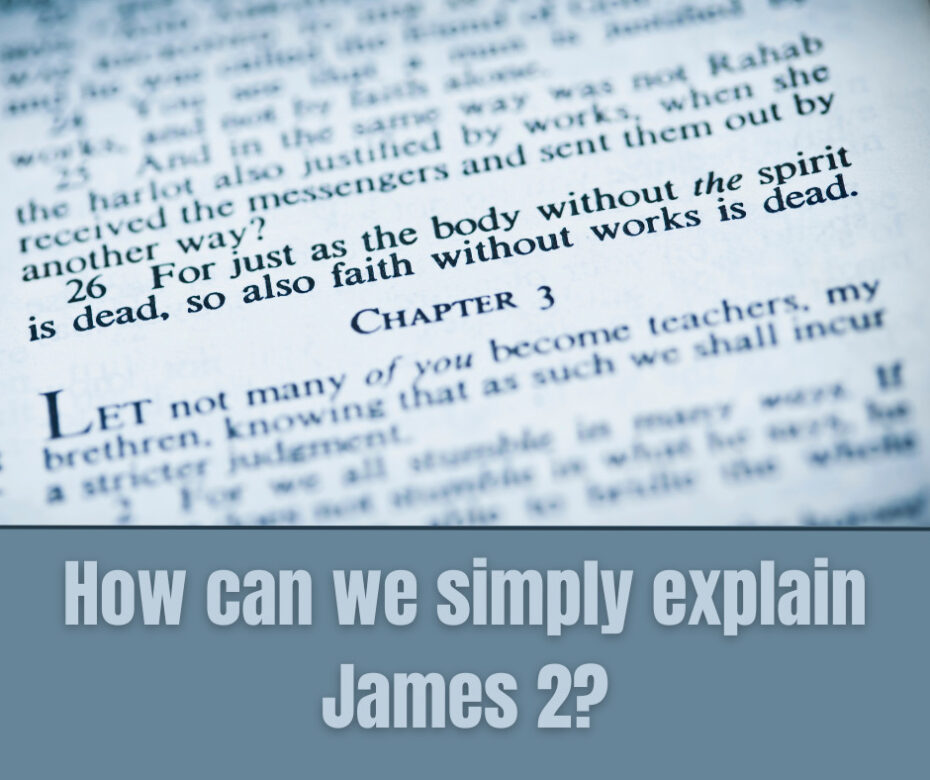Imagine that you get a knock on your front door and are faced with two Jehovah’s Witnesses. They proceed to evangelize you according to their works-based doctrine. They’re nice and seemingly sincere, but obviously confused about the free gift of eternal life. As the conversation goes on, you share the saving message of eternal life as a free gift to those who simply believe in Jesus alone for it. However, they respond to the saving message by quoting James 2. They argue that works are necessary and that they prove salvation. How would you answer their question?
James 2:14-26 has long been a hotbed of theological debate. When explaining James 2:14-26, there’s a lot to cover. For example, the words save, dead, and justified need to be defined. The context of the book needs attention, as well as the use of the Greek diatribe. You also have to overcome centuries of tradition and misuse. It can be daunting to explain James 2, especially to those who struggle to understand the free gift of eternal life by faith alone in Jesus.
Last month, I was faced with this situation. I attempted to explain James 2. However, if I am being honest, I think my response was confusing to the ladies on my front porch. While I kept it short, I explained too much, and their eyes got glossy. They ended the conversation quickly and left.
As I considered this exchange, I was reminded of the old acronym KISS, which stands for “Keep It Simple Saint.” When discussing doctrine, especially with unbelievers, it’s important to simplify. When it comes to James 2, how can Free Grace teachers simplify the conversation in a meaningful way that clarifies and does not confuse? How could I have done better?
There’s more than one way to skin a cat. The setting and time you have with the person will impact how you respond to this issue. However, what if you only have one minute on your front porch, as I had? Yesterday I was walking someone through James 2 again. This time, I stumbled onto a summary statement that I wish I had thought of a month ago when speaking to the Jehovah’s Witnesses:
James isn’t teaching that works PROVE our faith,
he’s teaching that works IMPROVE our faith.
I find this helpful. It’s short, it draws a contrast to what is typically taught, and it’s a play on words. It is also easy to remember.
In James 2, we are given the example of Abraham offering Isaac as a sacrifice. This event is familiar to most people who ask about James 2. It is therefore a great example to draw upon. It also took place decades after the Lord declared the patriarch righteous by faith (Gen 15:6). Abraham’s obedience to the Lord is not given as proof of salvation, but it shows his maturity. Before this event, Abraham made a lot of immature decisions. He lied about his wife’s identity (twice!) in order to save his own skin. He was fearful and attempted to circumvent God’s plan by sleeping with Hagar. However, after decades of walking with the Lord, he faithfully obeyed when asked to sacrifice his beloved child. His faith had IMPROVED. In this passage, we see a man whose faith has grown. This was a unique moment in the life of Abraham. His works had matured to the point that he was willing to sacrifice the thing he loved most. That’s spiritual growth, not spiritual birth. His works didn’t PROVE his faith, his works IMPROVED his faith. A lot of believers don’t reach that level of spiritual maturity.
Lordship proponents have a famous expression. They often attempt to explain James 2 by saying: “We are saved by faith alone, but the faith that saves is never alone.” In other words, if you are saved, you will have works. This is a contradictory statement, according to Rom 11:6. However, the platitude has become so popularized that it is now the common understanding. It is so ingrained in church culture that it has become a fact to many. However, this runs counter to the teachings of the NT, including the Book of James. Works are not automatic, and maturity is a process. Abraham is the perfect example of this fact.
That said, Lordship teachers have done a good job of simplifying their position with this phrase. It’s short and gets to the point of their message, without overwhelming. In the same way, Free Grace teachers might consider using a simplified summary.
Works don’t PROVE faith; they IMPROVE our faith.
GES has written several articles and blogs addressing James 2. In addition, Zane Hodges has a commentary on the Book of James that is available in our bookstore.

